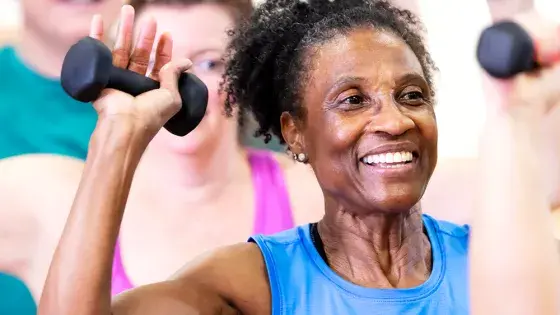As we start off the new year, many of us will be launching ourselves into our New Year resolutions - that often include becoming more active or getting back into a gym routine.
One of the central pillars of physical activity is cardiovascular training (CV). CV training is physical conditioning that exercises the heart, lungs, and associated blood vessels. In other words, when you do a cardio session, you’re giving your heart, lungs, and circulatory system - in addition to any other muscle groups that you use - a good workout.
Benefits of cardio training include:
- Building up the heart muscle enables the body to better take in and process oxygen.
- Maintaining a healthy heart is a priority when confronted by such health risks as a sedentary lifestyle, smoking, cholesterol, and diabetes.
- It contributes to weight loss, particularly by promoting fat loss (especially belly fat) in favour of muscle mass.
- When performing cardio exercises properly, you will strengthen other muscles, too, such as arms, legs, abs and lumbar muscles.
- It fortifies the arteries and reduces the risk of hypertension and infarction.
- It stimulates immune defences.
- It lifts the spirits and helps to fight against stress, negative thoughts, and even depression.
Cardiovascular exercise can be classified into three categories—high-impact cardio, low-impact cardio and no-impact cardio.
High-impact workouts, such as running or dancing, are excellent cardio because they use the large muscles of the legs and you have to stand up throughout your workout.
Low-impact activities are those in which one foot always remains on the ground. It is still a weight-bearing exercise and good for maintaining healthy bones and conditioning the lungs and heart. Examples of low-impact cardio include walking, hiking and low-impact aerobic dance.
When CV exercise is performed in water, the activity is classified as no-impact because being immersed in water reduces the pull of gravity on the body. Cycling is also a no-impact workout, as the bike supports most of the bodyweight. These are great if you have an arthritic condition or are undergoing injury rehabilitation.
How often you should do a cardio workout:
Adults should do some type of physical activity every day. Per week, for adults aged 19-64, it is recommended to do at least:
- 150 minutes of moderate intensity cardio or;
- 75 minutes of vigorous intensity cardio (if you're working at this level, you will not be able to say more than a few words without pausing for breath) or;
- An equivalent combination of both
It was previously recommended that bouts of physical activity should be >10mins to garner meaningful benefits. However, recent cohort studies have demonstrated that physical activity of any duration can lead to a range of benefits to our health. This is an important development as it removes on of the key barriers many of us face when trying to get more active: time.
Additional benefits of CV training..
- Engaging with regular physical activity is a fantastic way to maintain a healthy bodyweight.
The typical objective of cardio is to metabolise, or ‘burn’, fat mass. Our body does this by breaking down fat cells into fatty acids, which are then used to fuel the production of energy.
Maintaining a healthy bodyweight is crucial to both our physical and mental health, and has many well documented benefits, including:
- contributing to the prevention and management of numerous non-communicable diseases (including cardiovascular diseases, several cancers, and type 2 diabetes).
- helping reduce the feelings of stress and anxiety.
Intensity is a key factor here, as too high an intensity requires the metabolism of stored carbohydrates and will therefore potentially reduce the use of fatty acids. However, this does not mean that more intense or interval style exercise cannot have its place within our exercise regimes. - CV exercise can help us manage our cholesterol levels.
Regular CV exercise has been linked to increased concentrations of ‘good’ cholesterol (high-density lipoproteins); these are the vehicles that absorb cholesterol and transport it back to the liver, where it can be flushed from the body. This is one mechanism that helps lower our risk of cardiovascular disease.
It can also help reduce ‘bad’ cholesterol (low density lipoproteins) levels. Elevated levels of bad cholesterol can lead to clogs in our blood vessels, so it is important to moderate this any way we can. - We can control our blood sugar better through improved glucose tolerance and insulin sensitivity.
Glucose tolerance refers to our body's ability to process ingested glucose (that is, convert it to glycogen and store in in the muscles/liver). An improved tolerance is important because it helps prevent our blood sugar levels becoming too high, which could contribute to the onset of type 2 diabetes.
Similarly, insulin sensitivity refers to how responsive our bodies are to insulin. Insulin is a hormone which helps transport glucose out of our blood stream and into our cells to provide us with energy. Greater sensitivity means we will require less insulin to deal with ingested glucose, again helping to prevent excessive levels of glucose remaining in our bloodstream.
In summary, there are many benefits to engaging with regular CV exercise, and it should therefore form a key component of a healthy lifestyle.
Finally, it’s important remember that to make regular exercise a habit, we cannot put too much pressure on ourselves to immediately achieve every recommendation as detailed above. Start small with achievable goals, before gradually building up over time. By approaching cardio in this way, we will hopefully avoid the potential feeling of failure if we do not hit a lofty target, instead gaining satisfaction as we regularly achieve what we set out to.
Speak to your GP first if you have not exercised for some time, or if you have medical conditions or concerns. Make sure your activity and its intensity are appropriate for your fitness.
References:
- Physical activity guidelines for adults aged 19 to 64 - NHS (www.nhs.uk)
- What Is Cardiovascular Training? | realbuzz.com
- What Is a Cardiovascular Exercise? (fyzical.com)
- Why is cardiovascular training so important? | NordicTrack Blog

